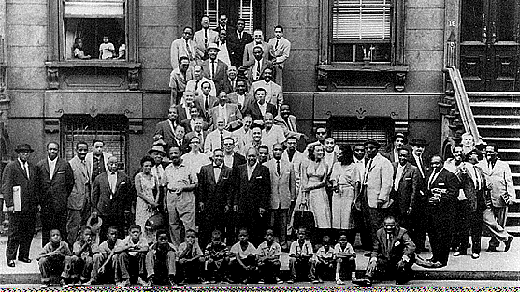Much of Not Without Laughter is semi-autobiographical. Hughes admitted that he based Stanton, and many of the people and places in it, on his experiences in Lawrence. There are differences between Hughes' life and Sandy's, however. As Hughes explained in his first autobiography, The Big Sea:
| The Negro Speaks of Rivers by Langston Hughes I've known rivers: I've known rivers ancient as the world and older than the flow of human blood in human veins. My soul has grown deep like the rivers. I bathed in the Euphrates when dawns were young. I built my hut near the Congo and it lulled me to sleep. I looked upon the Nile and raised the pyramids above it. I heard the singing of the Mississippi when Abe Lincoln went down to New Orleans, and I've seen its muddy bosom turn all golden in the sunset. I've known rivers: Ancient, dusky rivers. My soul has grown deep like the rivers. Originally published in Crisis, June 1921. Reprinted in The Weary Blues, 1926. |
"I wanted to write about a typical Negro family in the Middle West, about people like those I had known in Kansas. But mine was not a typical Negro family. My grandmother never took in washing or worked in service or went much to church. She had lived in Oberlin and spoke perfect English, without a trace of dialect. She looked like an Indian. My mother was a newspaper woman and a stenographer then. My father lived in Mexico City. My granduncle had been a congressman. And there were heroic memories of John Brown's raid and the underground railroad in the family storehouse."
"But I thought maybe I had been a typical Negro boy. I grew up with the other Negro children of Lawrence, sons and daughters of family friends. I had an uncle of sorts who ran a barber shop in Kansas City. And later I had a stepfather who was a wanderer. We were poor--but different. For purposes of the novel, however, I created around myself what seemed to me a family more typical of Negro life in Kansas than my own had been. I gave myself aunts that I didn't have, modeled after other children's aunts whom I had known. But I put in a real cyclone that had blown my grandmother's porch away. And I added dances and songs I remembered. I brought the boy to Chicago in his teens, as I had come to Chicago--but I did not leave behind a well-fixed aunt whose husband was a mail clerk."\
http://www.continuinged.ku.edu/hughes/files_city/laughter.html
I was doing some research about the book, just because we had all had some hard time figuring out the book. I thought this was a little interesting and that perhaps it might help us with the book. I also discovered that this was his first piece of prose, so perhaps he was having a hard time negotiating between being a poet and an author of prose.......... hum.........






1 comment:
Your research is insightfull. Getting to understand the creative process also helps us to understand that this is not a work depicting the African American experience as a whole. This is a combination of many different facets of culture, but within the "African American" community there are many different cultures. I guess the info you provided also helps me with the chapter titled "Dance" through which I imagined Hughes more as an observant than as a participant. There is no way you can capture all of that detail with memory. It is like a painting the way he writes, he has such keen observations. Thanks for the extra work.
Post a Comment